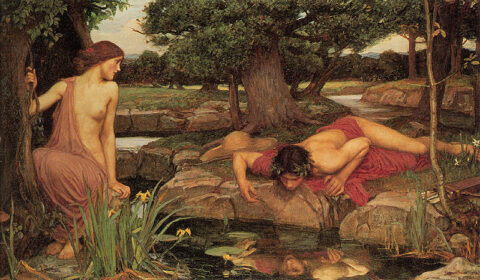Rob Henderson discusses the psychology of narcissistic individuals:

“Echo and Narcissus” by John William Waterhouse, 1903.
Oil painting from the Walker Art Gallery via Wikimedia Commons.
One of my favorite blogs from the Before Times was The Last Psychiatrist. He is most known for his writings on narcissism. When I discovered him in 2015, I read through most of his archive over the course of a few weeks. You can read my review of his book here.
On narcissistic injury and narcissistic rage:
A narcissistic injury occurs when the narcissist is confronted with the reality that he is not the main character in his movie … The worst thing that could happen to a narcissist is not that his wife cheats on him and leaves him for another man … He’s still the main character in his movie; it was a romantic comedy but now it’s a break-up film … The worst thing that could happen to a narcissist is that his wife cheats on him secretly and never tells him, and she doesn’t act any differently towards him, so that he couldn’t even tell. If she can do all that, that means she exists independently of him. He is not the main character in the movie. She has her own movie and he’s not even in it. That’s a narcissistic injury … But all narcissistic injuries lead to rage … The violence serves two necessary psychological functions: first, it’s the natural byproduct of rage. Second, the violence perpetuates the link, the relationship, keeps him in the lead role. “That slut may have had a whole life outside me, but I will make her forever afraid of me.” Or he kills himself — not because he can’t live without her, but because from now on she won’t be able to live without thinking about him. See? Now it’s a drama, but the movie goes on. So if you cause a narcissist to have a narcissistic injury, get ready for a fight.
Psychological researchers have found that there are two categories of narcissist:
- Grandiose narcissists: Dominant, extraverted, overconfident, exploitative, egotistical, low emotional distress. This is the version of narcissism people tend to be most familiar with.
- Vulnerable narcissists: Self-centered, introverted, defensive, resentful, high emotional distress. Psychologists sometimes refer to them “hidden” or “shy” or “covert” narcissists because they don’t self-promote the way the grandiose types do.
Grandiose narcissists enjoy seeking any kind of attention. Their positive self-image is resistant to criticism. They always think they’re amazing no matter what people say.
In contrast, vulnerable narcissists have mixed feelings about seeking attention. They are overly excited at the prospect of positive feedback but excessively sensitive to negative feedback. They have a high opinion of themselves but this high opinion can be thwarted if the external world does not validate it.
Both types tend to be exploitative, hold high opinions of themselves, and see themselves as deserving of special treatment.
Compared to grandiose narcissists, vulnerable narcissists are more sensitive to insults, ruminate more about perceived unfairness, and report more anger when they do not receive what they think they deserve. Although vulnerable narcissists require external feedback to maintain their sense of self, they are often dissatisfied with the feedback they receive.



